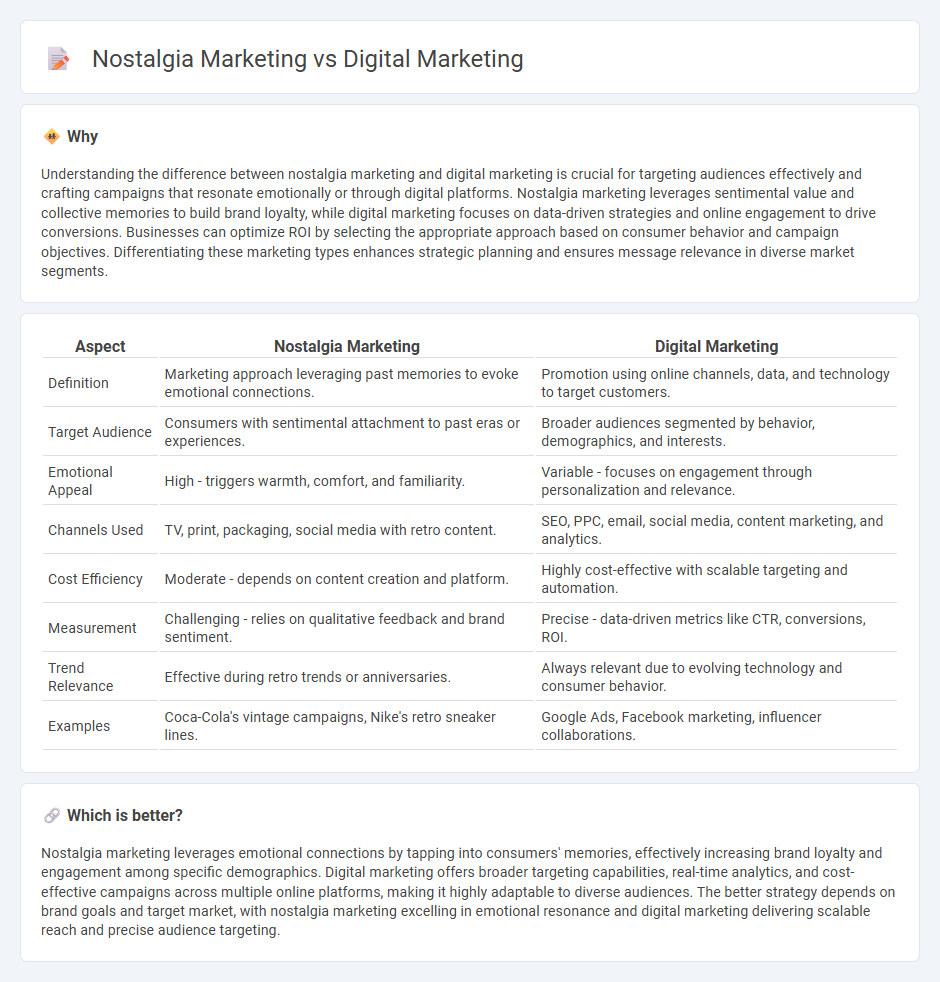
Nostalgia marketing leverages consumers' emotional connections to past experiences, tapping into memories to build brand loyalty and deepen engagement. Digital marketing focuses on data-driven strategies utilizing online platforms such as social media, search engines, and email campaigns to target specific audiences efficiently. Explore the distinct advantages and applications of nostalgia marketing versus digital marketing to enhance your brand strategy.
Why it is important
Understanding the difference between nostalgia marketing and digital marketing is crucial for targeting audiences effectively and crafting campaigns that resonate emotionally or through digital platforms. Nostalgia marketing leverages sentimental value and collective memories to build brand loyalty, while digital marketing focuses on data-driven strategies and online engagement to drive conversions. Businesses can optimize ROI by selecting the appropriate approach based on consumer behavior and campaign objectives. Differentiating these marketing types enhances strategic planning and ensures message relevance in diverse market segments.
Comparison Table
| Aspect | Nostalgia Marketing | Digital Marketing |
|---|---|---|
| Definition | Marketing approach leveraging past memories to evoke emotional connections. | Promotion using online channels, data, and technology to target customers. |
| Target Audience | Consumers with sentimental attachment to past eras or experiences. | Broader audiences segmented by behavior, demographics, and interests. |
| Emotional Appeal | High - triggers warmth, comfort, and familiarity. | Variable - focuses on engagement through personalization and relevance. |
| Channels Used | TV, print, packaging, social media with retro content. | SEO, PPC, email, social media, content marketing, and analytics. |
| Cost Efficiency | Moderate - depends on content creation and platform. | Highly cost-effective with scalable targeting and automation. |
| Measurement | Challenging - relies on qualitative feedback and brand sentiment. | Precise - data-driven metrics like CTR, conversions, ROI. |
| Trend Relevance | Effective during retro trends or anniversaries. | Always relevant due to evolving technology and consumer behavior. |
| Examples | Coca-Cola's vintage campaigns, Nike's retro sneaker lines. | Google Ads, Facebook marketing, influencer collaborations. |
Which is better?
Nostalgia marketing leverages emotional connections by tapping into consumers' memories, effectively increasing brand loyalty and engagement among specific demographics. Digital marketing offers broader targeting capabilities, real-time analytics, and cost-effective campaigns across multiple online platforms, making it highly adaptable to diverse audiences. The better strategy depends on brand goals and target market, with nostalgia marketing excelling in emotional resonance and digital marketing delivering scalable reach and precise audience targeting.
Connection
Nostalgia marketing leverages emotional connections to past experiences, enhancing digital marketing strategies by creating relatable and memorable content for online audiences. Integrating nostalgic elements into digital campaigns increases engagement rates and boosts brand loyalty across social media platforms and email marketing. Data shows that 70% of consumers report higher trust in brands that effectively use nostalgia within digital marketing efforts.
Key Terms
**Digital Marketing:**
Digital marketing leverages data-driven strategies such as SEO, PPC, social media advertising, and content marketing to target specific audience segments with measurable ROI. It utilizes real-time analytics and automation tools to optimize campaigns across multiple platforms, ensuring higher engagement and conversion rates. Explore the latest trends and tools in digital marketing to boost your brand's online presence and performance.
SEO (Search Engine Optimization)
Digital marketing leverages SEO strategies such as keyword optimization, backlink building, and content marketing to increase online visibility and drive targeted traffic to websites. Nostalgia marketing integrates emotionally resonant themes and retro keywords to enhance user engagement and improve search rankings by tapping into consumers' sentimental memories. Explore the nuances of combining these approaches to maximize SEO impact.
Social Media Advertising
Digital marketing leverages data-driven strategies on social media platforms such as Facebook, Instagram, and TikTok to target specific audiences with personalized content, boosting engagement and conversion rates. Nostalgia marketing taps into emotional connections by evoking memories through retro-themed ads and familiar cultural references, increasing brand affinity and shareability on social channels. Explore how blending these approaches can maximize your social media advertising impact.
Source and External Links
What is Digital Marketing and How Does it Work? - Digital marketing is the promotion of brands to connect with potential customers using the internet and digital communication channels like social media, email, and web advertising, enabling brands to build connections, provide customer experiences, and bring in new customers through a strategic use of online platforms and automation.
What Is Digital Marketing? Key Channels, Examples, and ... - Digital marketing is the practice of promoting brands, products, and services using digital channels such as websites, email, and social media to reach customers online and generate data-driven marketing insights for real-time strategy adjustment.
What is Digital Marketing? - Digital marketing encompasses various methods like SEO, SEM, PPC, social media marketing, email marketing, affiliate marketing, content marketing, and native advertising, which businesses tailor and combine to meet their unique goals and reach prospective customers effectively.
 dowidth.com
dowidth.com